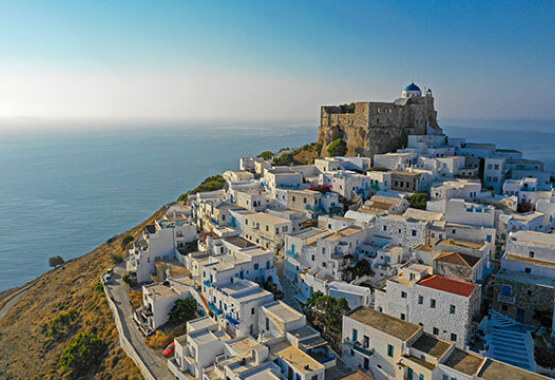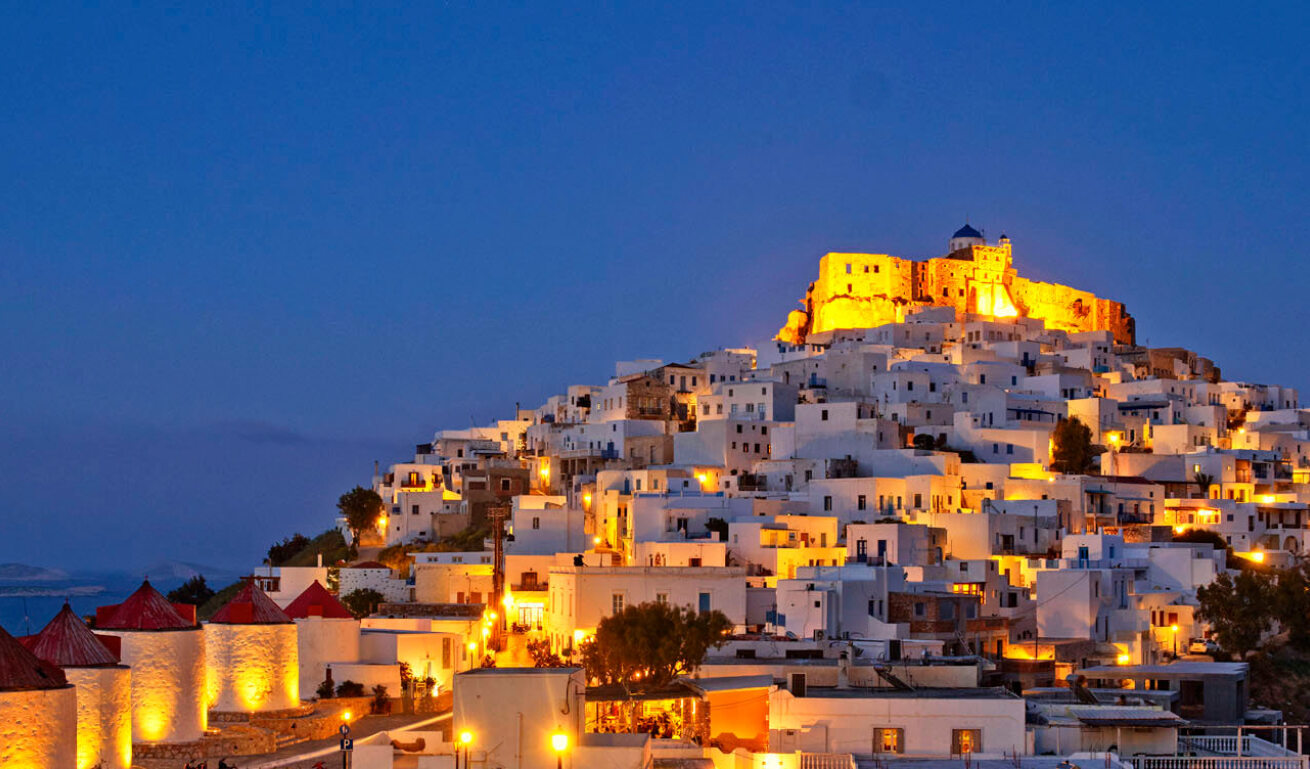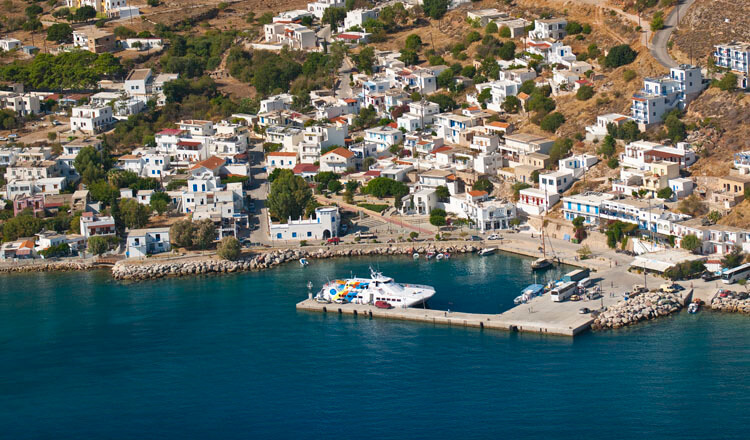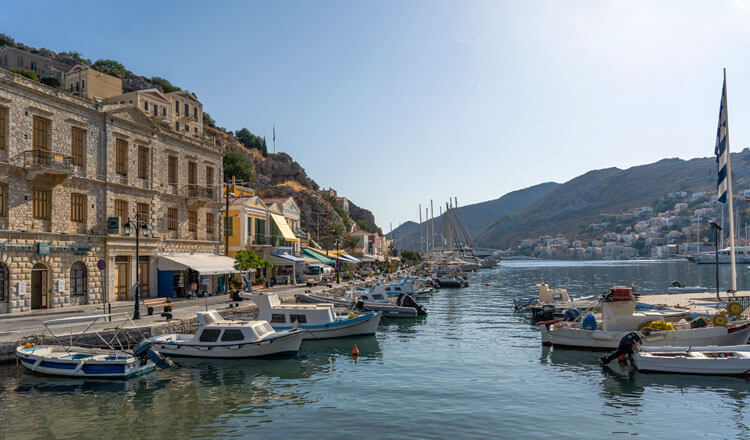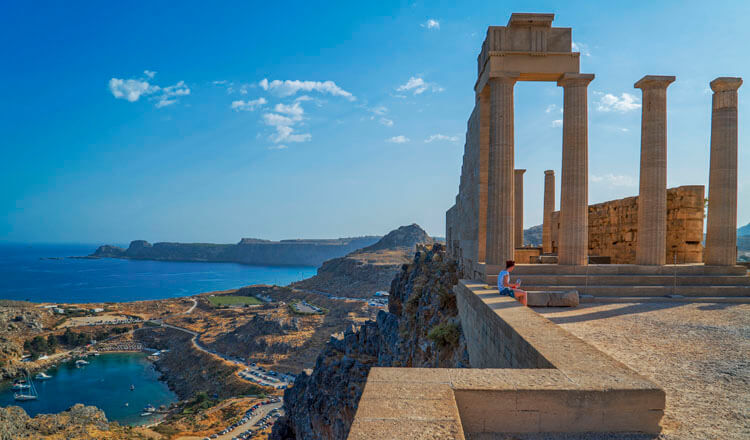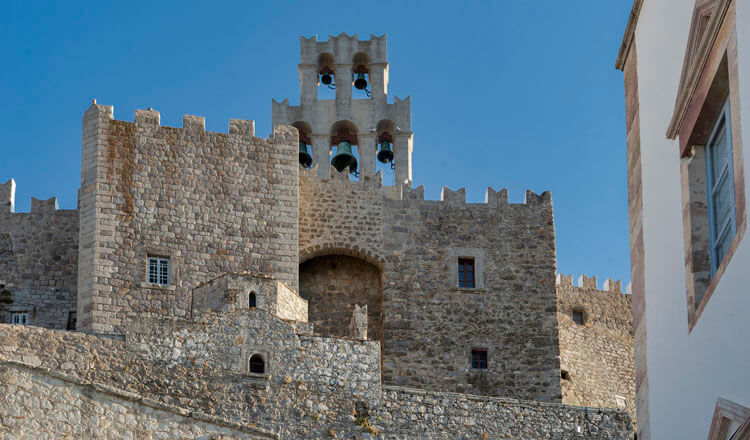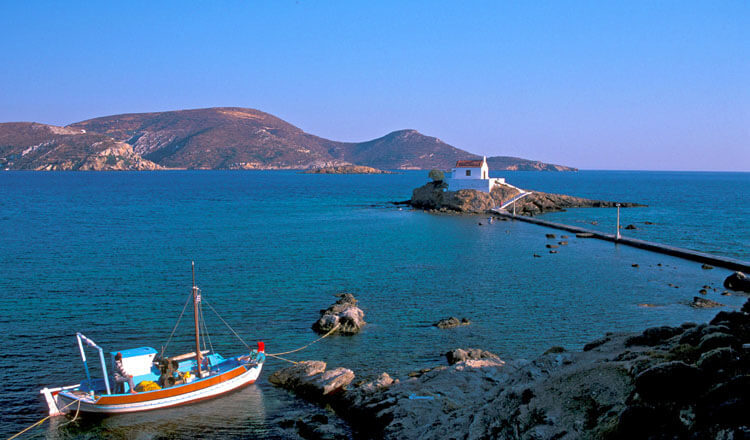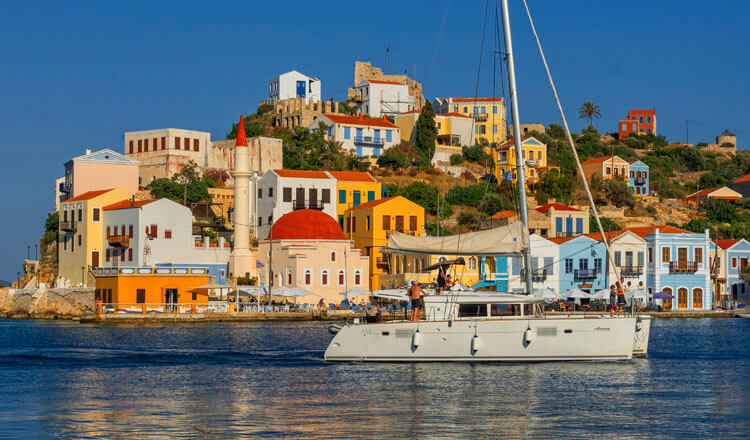Tour of the Island
Chora Town Promenade
While you visit Chora don’t miss the
Venetian Guerini Castle (13th c). The small three-storey houses built in the castle’s outer grounds are of particular architectural interest since the outer walls of the houses form the castle wall and narrow windows were used as battlements. Within the castle there are two churches, painted in a pure white colour, with elaborate stone belfries: Panagia Evangelistria (1853), inside which you will see the founders’ inscription dated 1413 and the Guerini coats of arms; and Agios Georgios.
Pay a visit to the
Panagia Portaitissa church (18th C) below the castle, one of the most beautiful churches in the Dodecanese with a wood carved, gilded iconostasis (wall of icons and religious paintings). Right next to the church is an interesting
Ecclesiastical Museum. The island’s biggest religious celebration August 15th (aka Panagia) takes place here, which lasts for three days from the 14th to the 16th of August. On August 16th, the municipal authority and the Cultural Organisation arrange a special sports event called “Koukania”.
Make a stop by the
Narkisseios Municipal Library, also housing the island’s archeological collection as well as the
Archeological Museum in
Pera Gialos where finds from around the island are on display. Most of them date back to prehistoric times when Astypalaia flourished.
Stop and take some
pictures by the eight
windmills located over
Skala, in
Chora. An interesting fact about these is that their roof turns according to the wind direction.
Some more interesting things to see are:
- Kylintra, located south of Chora, is the site where a burial ground for infants was excavated. This place was considered as sacred ground since the Geometric Period and up to the Hellenistic times.
- Megali Panagia Church has a remarkable pebbled floor courtyard.
- Panagia Flevariotissa Church (6 km NW from Chora) has a part of it built inside a cave and a beautiful wood carved iconostasis. If you are here February 1st., Panagia Flevariotissa holds the winter reunion feast for the islanders so make sure you experience this local event.
- Monastery of Agios Ioannis Makris (12 km W) is built in an imposing landscape between two steep slopes, overlooking the open sea and offering a spectacular sunset view.
- the castle and the monastery of Ai-Giannis.
Trips around Astypalaia
West (Inner Island)
Livadia
Livadia is located 2 km SW from Chora and is a seaside village with few residents, built in a fertile valley. There are citrus groves, vineyards and houses wrapped in flowers, making a delightful setting next to a lovely beach. Don’t miss
Negros cave, at Vatses (6 km SW), which can be reached by boat from Chora. Visit
Agios Vasileios hill where you can see the ruins of an early-Christian basilica.
East (Outer Island)
Maltezana (Analipsi)
Maltezana is located 9 km NE from Chora and is a seaside village that attracts most of the island’s tourism. It was named after the Maltese pirates who used the island as their hideout. This is where the French Admiral Bigot set his ship on fire in 1827 to avoid being captured by the pirates. Make sure you see the
monument in
honour of the
French Admiral Bigot who led the struggle against the pirates. Pay a visit to the
Talaras Baths to see the Hellenistic period mosaics, unique within Greece, coloured in shades of light blue and tints of brick, with interesting depictions of the four seasons and symbols of the zodiac.
Make a stop by the ruins of an
early-Christian basilica (5th c.) with remarkable mosaics as well as
Agia Varvara chapel built over those ruins.
Vathy
Vathy village is located 21 km NE. from Chora and home to a beautiful narrow (50m) sheltered bay. The village consists of two small communities: Exo [outer] Vathy is located in the entrance of the bay where boats moor and Mesa [inner] Vathy in the far end of the bay next to cropland, sparse tree vegetation and vineyards. Explore Chameni Limni (meaning lost lake), a lagoon in the NE side of Astypalaia. Visit the ruins of a Minoan settlement and tower situated at the entrance to the cove. Reach
Drakos cave by boat and see impressive stalagmite and stalactite formations. Stop by
Panagia Poulariani church, on the way to Vathy, built on a rock formation which looks like the Virgin Mary holding the Baby Jesus.
Nearby Islets to Explore
From Maltezana cove take an excursion boat and visit Diaporia, Ligno, Chondro, Kounoupoi and Koutsomyri islands (SE) as well as Agia Kyriaki island and its beautiful beach (S). Farther away, to the NE of Astypalaia, visit Fokionisia; then Panormos and Katsagreli to the NW; Pontikousa and Ofidousa to the E; and finally Syrna, Katsikoulia, Tria Nisia, Meso, Stefania, and Zafora isles to the SE.
Beaches
Do not miss the beaches of Agios Konstantinos, Vatses, Plakes, Kaminakia, Agios Giannis, Panormos, Pachia Ammos, Pera Gialos and Livadia. Finally, a boat journey to the beaches of the nearby islets of Koutsomiti and Syrna is highly recommended.
